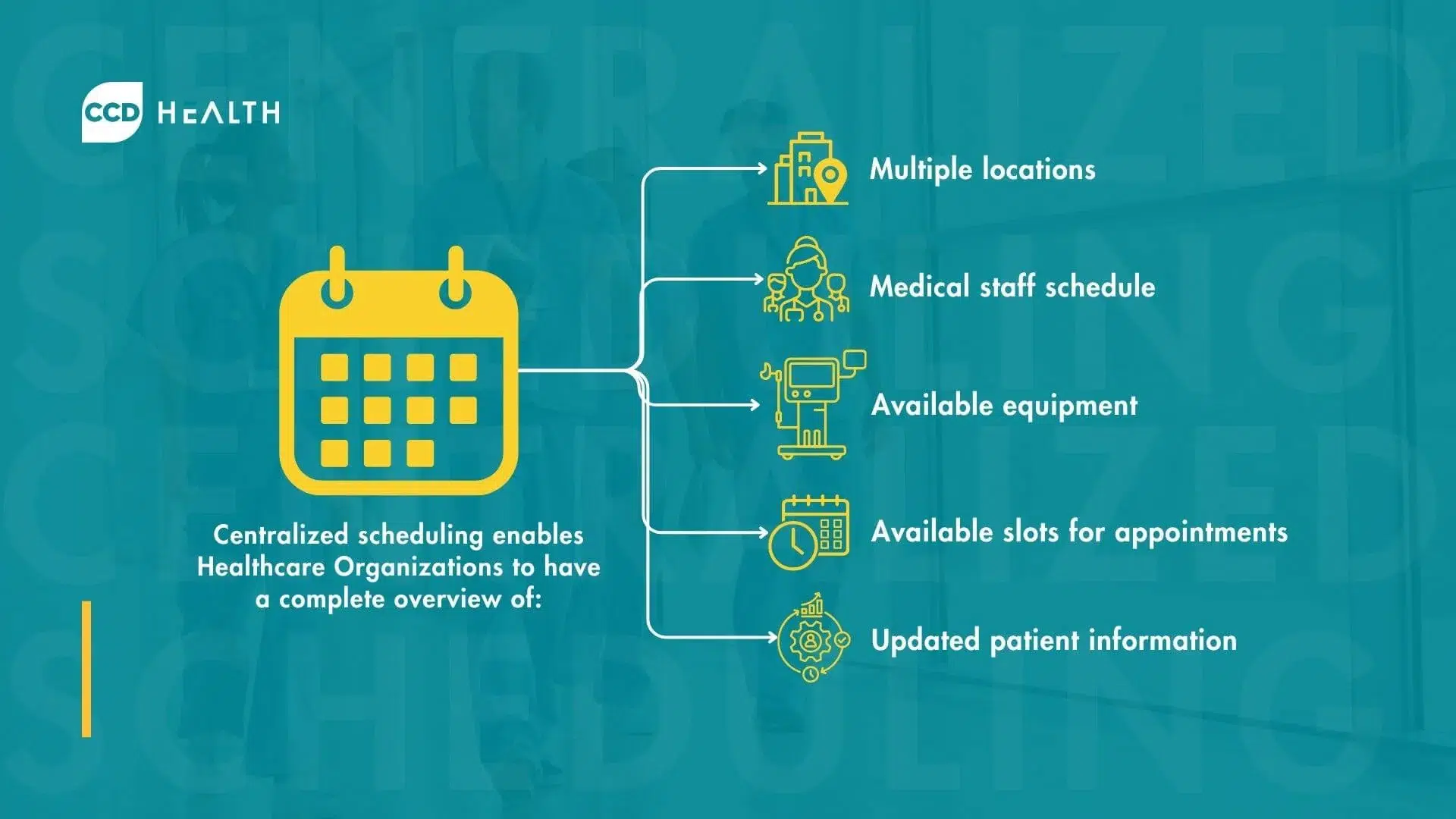Top 10 Benefits of Centralized Scheduling for Healthcare Centers

Discover the top 10 benefits of centralized scheduling for healthcare centers and how it improves efficiency, patient care, and resource allocation.
Centralized scheduling refers to organizing and managing appointment scheduling, tasks, and resources from a single central location or system.
A centralized scheduling system can be beneficial for:
- Healthcare centers with multiple locations
- Multispecialty healthcare centers
- Healthcare Networks
- Multilocation practices and clinics
This scheduling model makes it easier for healthcare organizations to have greater control and oversight in their operations, enabling managers to track progress, monitor performance, and make informed decisions based on real-time data. It also promotes standardization and consistency across different departments or locations. However, it’s essential to consider potential drawbacks such as a single point of failure, dependency on the central authority, and the need for robust infrastructure to support the centralized scheduling system. Despite these challenges, the benefits of centralized scheduling make it a valuable model for optimizing productivity and efficiency and maintaining healthcare quality.
Here’s what adopting a centralized can do for your Healthcare Organization:
Top 10 benefits of centralized scheduling for Healthcare Centers
1. Improved operational efficiency
Centralized scheduling optimizes resource allocation by efficiently distributing patient appointments across different locations based on availability and proximity. This ensures maximum utilization of healthcare resources, minimizes idle time and reduces administrative burden.
2. Reduced wait times
Having a global view of appointments, physicians’ schedules, equipment, and available slots results in better appointment coordination and resources and allows Healthcare Centers to ensure that appointments are spaced appropriately, reducing patient wait times and improving overall satisfaction.
3. Efficient communication
Through a centralized model, stakeholders can exchange vital information, coordinate care plans, and address patient inquiries promptly, leading to improved care coordination and patient outcomes.
4. Better staff productivity
Accessing real-time schedules, patient information, and task assignments from a centralized scheduling overview helps healthcare staff efficiently manage their workload, prioritize tasks, streamline workflows, and allocate resources effectively, boosting productivity and morale.
5. Cost-effectiveness
Multi-location healthcare centers can significantly reduce overhead costs, maximize revenue potential, and achieve greater financial sustainability with a scheduling model that minimizes inefficiencies associated with manual scheduling processes, such as double bookings, missed appointments, and underutilized resources.
On the other hand, there’s also the completion rate improvement a Center can realize when implementing this model. For example, in this assessment 1, the gastroenterology department went from a 54.2% to a 67.3% increase in completion rate from referrals just after six months of adopting a centralized model.
6. Improved data security
Centralized scheduling systems adhere to stringent data security protocols to safeguard patient information against unauthorized access, breaches, or cyber threats. Healthcare facilities ensure compliance with privacy regulations and maintain patient trust by centralizing data storage and implementing robust encryption measures.
7. Up-to-date reporting and analytics
Centralized scheduling models offer robust reporting and analytics capabilities, enabling healthcare administrators to gain valuable insights into scheduling trends, patient demographics, and operational performance. This data-driven approach empowers decision-making, facilitates strategic planning, and drives continuous improvement initiatives.
8. Better resource administration
Healthcare centers with multiple locations or specialties often struggle to have a full picture regarding equipment, staff, and facilities. A centralized scheduling model will allow them to detect inefficiencies based on demand fluctuations, seasonal trends, and geographic factors. It will also guarantee ongoing optimization always to offer equitable access to healthcare services across all locations.
9. Enhanced and easy-to-integrate scalability
Whether opening new facilities, adding specialty services, or accommodating patient growth, centralized scheduling can easily be adapted to a Healthcare Organization’s needs seamlessly and without compromising efficiency or quality of care.
10. Improved accessibility
Healthcare organizations not only struggle with managing multiple locations and specialties but also need to offer various communication channels in different languages and logistics to maintain access to healthcare. In this context, centralized scheduling promotes equity and accessibility by ensuring fair distribution of healthcare services across diverse populations and geographic regions.
The benefits of centralized scheduling for healthcare centers are undeniable. From expediting patient care to enhancing analytical capabilities and managing provider preferences to automating waitlists, the impact can be noticed not only across your center operations but also in patient experience and outcomes.
References:
- Bongers Q, Crotty BH, Decker MC, Fangman J. Does a Centralized Scheduling Process Improve Referral Timeliness? WMJ. 2021 Oct;120(3):200-204. PMID: 34710301.




